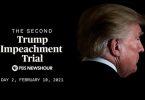GOP Lawmakers Propose Bill to Separate Chicago From Illinois
The legislation would be the first step toward making Chicago the 51st state
Legislation proposing the separation of Chicago from Illinois is intended to spark discussion about the overarching influence of the city in state politics, not actually lead to the creation of the 51st state, according to a central Illinois lawmaker who sponsored the measure.
GOP state Rep. C.D. Davidsmeyer, the bill ‘s sponsor, said the proposal would urge U.S. Congress to make the nation’s third-largest city its own state, the State Journal-Register reported.
“It’s more of a frustration of the policies than the true belief that Chicago and Illinois would be better off as separate states,” Davidsmeyer said. “I don’t believe that Chicago and the state of Illinois should be separated. Our relationship is mutually beneficial.”
Chicago needs to recognize how its policies impact rural Illinois, Davidsmeyer added.
“The reality is, the city of Chicago is competing with New York City and L.A. and San Francisco, and (downstate is) competing against rural Indiana and rural Missouri,” he said. “The policies that come down from Chicago are actually pushing our economic opportunity away.”
GOP state Rep. Brad Halbrook introduced the proposed measure in February. He co-sponsored a similar proposal last year that failed, and this year’s attempt has even less of a chance of succeeding in the Democratic-controlled Legislature. Illinois Gov. J.B. Pritzker and the leaders of the state House and Senate are all Democrats from Chicago.
Halbrook said the city of 2.7 million people differs ideologically from the rural population downstate on matters such as abortion and gun rights.
“Our traditional family values seem to be under attack at every angle,” Halbrook said. “We are trying to drive the discussion to get people at the table to say these are not our values down here.”
Forming a new state from a portion of a current state requires endorsement from Congress and the state legislature, according to the U.S. Constitution.
“When you have a large population center that seems to control the agenda for the rest of the state, it just kind of creates some issues,” Halbrook said. “The Constitution gives us a pathway, so we’ll see what happens.”
Tension between urban and rural areas aren’t exclusive to Illinois. The same has occurred in New York and California , according to a paper published last year by the Paul Simon Public Policy Institute at Southern Illinois University.
John Jackson, a visiting professor at the institute and co-author of the paper, said it’s odd that the bitterness has persisted for so long in Illinois.
“We ought to have leaders who get together and coalesce for the good of the state,” Jackson said. “The idea of this being a total zero-sum kind of game, that mentality ‘you win, I’ve got to lose,’ seems to be the mentality many have. That’s just not the case. The state needs to prosper together.”







